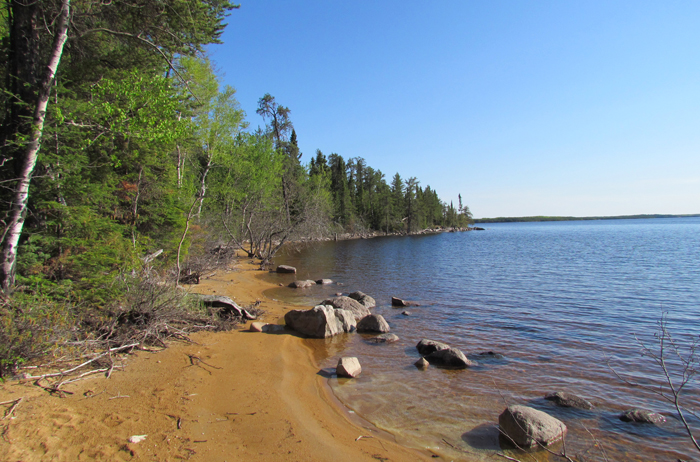Announcements
Top 10 2014 Stories: 6) Manitoba and Pimachiowin Aki
Pimachiowin Aki in Manitoba
Credit: Jeff Wells
While Manitoba is often thought of as a prairie province—even by most Manitobans—it is actually one of Canada's largest and most important boreal provinces. It shares with Ontario the single largest intact stretch of forest left on earth, and 80% of its 467,000-km² (47 million-hectare) boreal forest is still in relatively pristine condition. Initiatives to maintain this national treasure are likely to be at the forefront of boreal news in 2014.
The Government of Manitoba safeguarded more than 5,000 km² (500,000 hectares) of boreal forest in the past year—some of the largest protected areas of Boreal Shield in North America—through the codification of two community-led First Nations Land Management Plans built upon through the guidance of Anishinaabe Elders, whose ancestors have lived on the land for thousands of years.
But the story that caught most international attention in 2013 involved the efforts by First Nations, the Manitoba and Ontario governments, and a wide range of supporters to have the spectacular and pristine Pimachiowin Aki of northern Manitoba and Ontario declared a World Heritage Site. While the Pimachiowin Aki nomination did not get approved in 2013, it did expose a flaw in the World Heritage Site nomination process regarding indigenous peoples. This garnered criticism from indigenous groups around the world and from the delegates of a number of nomination committee members.
At its annual meeting, UNESCO's World Heritage Committee commended the province for its "exemplary efforts to develop a nomination that will protect, maintain and restore the significant cultural and natural assets and values associated with Pimachiowin Aki." The committee resolved to use the nomination as a case study to address "fundamental issues" in the evaluation process that prevented them from recognizing the value of "the indissoluble bonds that exist in some places between culture and nature." It also committed to "examine options for changes to the criteria and/or Advisory Body evaluation processes to address the issues raised by the nomination."
It is hoped that ultimately this nomination process will result not only in the inscription of Pimachiowin Aki as a World Heritage Site, but also in an improved evaluation process that is more open to and respectful of the values of all Aboriginal people around the world.
The Government of Manitoba's Green Plan, announced in 2013, also commits the province to protect its northern expanses through a Made in Manitoba Boreal Plan, which is expected to be launched in the coming months. For these and other reasons, Manitoba has been something of a bright spot, and will be a province that boreal watchers follow closely in 2014.
Resources
View Slideshow »


